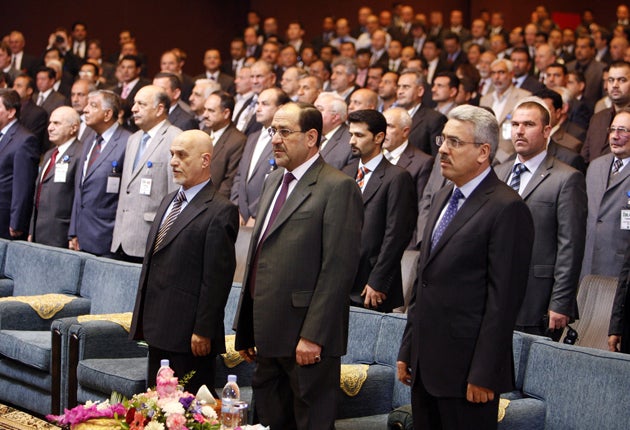Rush for Iraq's oil in defiance of bombers
Baghdad drives a hard bargain as drilling companies battle for access to reserves

Your support helps us to tell the story
From reproductive rights to climate change to Big Tech, The Independent is on the ground when the story is developing. Whether it's investigating the financials of Elon Musk's pro-Trump PAC or producing our latest documentary, 'The A Word', which shines a light on the American women fighting for reproductive rights, we know how important it is to parse out the facts from the messaging.
At such a critical moment in US history, we need reporters on the ground. Your donation allows us to keep sending journalists to speak to both sides of the story.
The Independent is trusted by Americans across the entire political spectrum. And unlike many other quality news outlets, we choose not to lock Americans out of our reporting and analysis with paywalls. We believe quality journalism should be available to everyone, paid for by those who can afford it.
Your support makes all the difference.Iraq is on course to become one of the world largest exporters of oil after international companies caved in yesterday by accepting low fees to develop the country's vast unexploited crude reserves. Representatives of 44 oil companies ignored the recent devastating bomb attacks in Baghdad to cram into a hall in the Oil Ministry to bid for contracts to increase production in Iraq's biggest oilfields.
The companies are so eager to get a foothold in the Iraqi oil sector that they are largely accepting tough Iraqi government terms, which many of them rejected at a previous auction in Baghdad six months ago.
The intense interest of the international oil industry in Iraq is fuelled by belief that it may have reserves, rivalling Saudi Arabia, which have gone unexploited or undiscovered during 30 years of war, rebellion and sanctions. The super-giant fields of south-east Iraq are the largest concentration of such fields in the world, according to experts.
Iraq desperately needs to increase its oil revenues to reconstruct the country as exports have remained at about two million barrels a day – fewer than the number under Saddam Hussein. By signing agreements with big oil companies Iraq intends to raise output from 2.5 million to 7 million barrels a day within six years,
At the start of the two-day auction the energy giant Shell and Malaysia's Petronas were awarded a contract to develop the massive Majnoon field in southern Iraq near the border with Iran. This has proven reserves of 12.58 billion barrels, but is currently producing only 45,000 barrels a day. Shell and Petronas have promised to raise output to 1.8 million barrels a day.
Given recent car bombs in Baghdad oil company officials had to leave their vehicles more than one mile away from the Iraqi Oil Ministry and make their way there on foot. Iraq's oil reserves are mostly in southern Iraq around Basra, in areas which are overwhelmingly Shia and where security is far better than in the centre of the country. There were no bidders yesterday for the East Baghdad field, which is in areas that continue to see frequent clashes.
A striking feature of the oil auction this month is that oil companies are accepting fees for raising oil output which they rejected last June. The Iraqi oil minister Hussain Shahristani has adamantly refused to give companies a share in Iraqi oil production. Instead, they are paid a fee for raising output above an agreed level. In the case of Shell and Petronas this will be $1.39 (86p) a barrel, which beat an offer from Total of France and the Chinese firm CNPC of $1.75 to raise output to 1.405 million barrels a day.
The profits for the oil companies will be limited under contracts now being agreed, but they have evidently decided to accept this to secure an entry ticket to a potential Iraqi oil bonanza.
"The second round of bidding represents a new era in the history of the Iraqi oil industry," said the Prime Minister Nouri al-Maliki as he opened the auction. For once such hyperbole may be true because it will see foreign oil companies returning to Iraq en masse for the first time since oil was nationalised in 1972.
Iraqis are intensely suspicious that President Bush's invasion of Iraq in 2003 was motivated by a plan to get hold of Iraqi oil. The government is intent on showing that it is not giving away control of Iraqi oil, the country's only asset. "The old way was in darkened rooms, behind closed doors," said Mr Maliki. "But today what is happening is clear to everyone."
The success of the oil auction is crucial to the future of Mr Maliki because present oil revenues, at around $60bn a year are only just enough to pay salaries and government expenses. There is little left for development and reconstruction of the economy, ruined by continuing conflict and sanctions since the start of the Iran-Iraq war in 1980. Critics argue that Iraq's own oil industry could have raised ouput by itself, but it is crippled by lack of money, organisation, equipment and personnel.
The Oil Ministry's strategy seems to have paid off. In the first auction in June only BP and China's CNPC were willing to accept a fee of $2 for each barrel of extra crude above a minimum production target produced in the super giant Rumaila, one of the largest oilfields in the world. But in recent weeks other big companies have followed suit. Mr Shahristani said: "They will not have a share of Iraqi oil, and our country will have total control over production."
Join our commenting forum
Join thought-provoking conversations, follow other Independent readers and see their replies
Comments